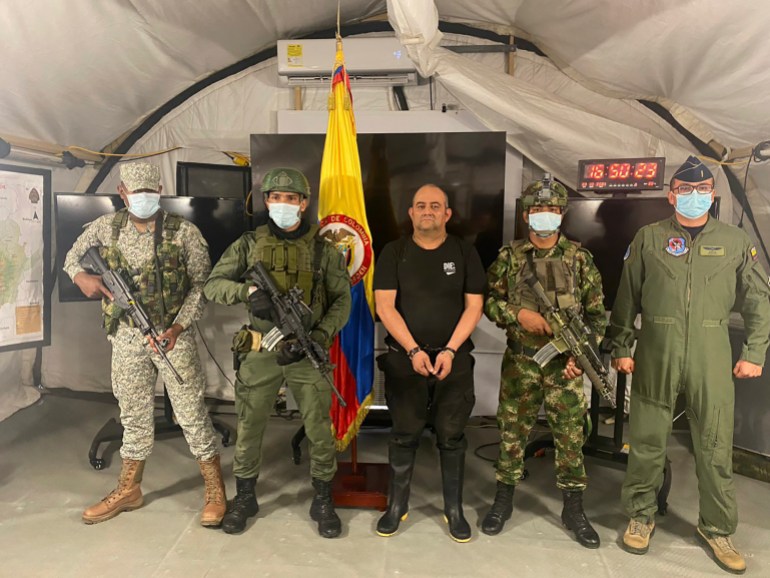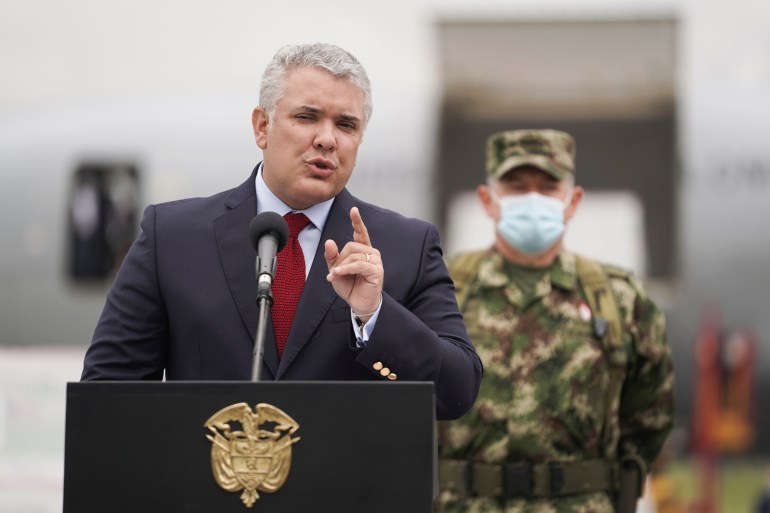
[ad_1]
Bogota, Colombia – “It was terrifying.”
That is how a resident of Tierralta, in Colombia’s northern department of Cordoba, described a days-long siege imposed earlier this month by one of the country’s largest paramilitary groups, the Autodefensas Gaitanistas de Colombia (AGC), also known as the Gulf Clan.
From the morning of May 5 until midnight on May 9, the armed group enforced a self-declared “armed strike” across the country’s northwest in response to the extradition to the United States of its former detained leader Dairo Antonio Usuga, also known as Otoniel .
The Gulf Clan took control of 11 of Colombia’s 32 departments over the four-day span. It imposed strict lockdowns, shuttered local businesses, closed off roads, disrupted transportation links, and warned residents to stay inside or risk being shot or having their vehicles destroyed.
Several towns ran out of basic supplies such as food and gas, while local hospitals faced staff shortages. Elsewhere, families were stranded at transport terminals, unable to get home due to blocked roads, local media reported.
“You live with the concern that it could happen again tomorrow,” said another resident of Tierralta, Raul, who also asked to use a pseudonym because of security concerns. “Because the Gulf Clan are showing that they have the power to create fear,” he told Al Jazeera.

Hundreds of rights violations
The Gulf Clan’s armed strike took place three weeks before Colombians will vote for their next president, raising concerns about the possibility of repeated violence as the population heads to the polls on May 29.
“The government response to this event leaves people more dissatisfied with their ability to express their political ideas or to participate in democracy. This event is very, very detrimental to the quality of democracy in Colombia and to the local perceptions of security,” said Sergio Guzman, director of the Colombia Risk Analysis consultancy group.
During the course of the “strike”, the Gulf Clan committed at least 309 acts of violence, according to the Special Jurisdiction of Peace (JEP) tribunal, which also registered the forced closure of 26 roads, the destruction of at least 118 vehicles and the disruption of 54 transport terminals.
A total of 178 different municipalities in the country were under Gulf Clan control, with 138 of them under strict lockdown rules.
“They wanted to demonstrate their military strength to show that in many areas of the country they are the de facto authority and not the state,” said a JEP representative, who spoke to Al Jazeera on condition of anonymity in order to speak freely.
The JEP was formed in the wake of a 2016 peace deal between the Revolutionary Armed Forces of Colombia (FARC) group and the government, with a mandate to investigate, prosecute and punish those responsible for the most serious human rights violations.
Twenty-four civilians were killed during the “strike”, the JEP also said, and a further 15 attempted murders were recorded. The Ministry of Defense reported six deaths, while NGO Indepaz recorded 18 over the course of the strike.
The official told Al Jazeera that three social leaders – a term used in Colombia to describe, the community defenders and representatives and – were among those rights killed.
‘Robust failure’
The Colombian government hailed Otoniel’s capture in October of last year and subsequent extradition to the US this month as a success – and a definitive blow to the Gulf Glan’s operations.
However, last week’s armed strike proved the group, which local NGO Pares has said counts as many as 3,260 members, is by no means on shaky ground, analysts said.
Since the 2016 peace agreement under which the FARC demobilised, armed groups such as the Gulf Clan have taken advantage of the power vacuum in much of Colombia’s rural areas. The Gulf Clan operates clandestinely in approximately 109 municipalities across the country, according to group Indepaz rights, but most predominantly in the north. It controls numerous drug trafficking routes and cocaine processing labs, and uses violence to extort and intimidate populations.
“This event underscores how much the government underestimated the nature of the [Gulf Clan’s] threat. This is very complicated for the government to somehow spin this towards anything but a robust failure of their security strategy,” Guzman told Al Jazeera.
Despite the strike being announced early on May 4, no military response from the government was seen until May 7, when troops were to join the affected Bolivar, Sucre, Cordoba and Antioquia regions to accompany vehicles and secure the roads. According to Ministry of Defense figures, more than 19,000 troops were across the area.

“They seek to generate intimidation through isolated events and cowardly attacks, which they seek to maximise online and in the media,” President Ivan Duque told reporters last Saturday. “They are desperately trying to show a strength that they do not have.”
But Guzman said the Gulf Clan will “likely be emboldened by the lack of confrontation with the military”.
“The government doesn’t want to contribute to the ‘we are back to war’ narrative, so escalating the situation could not just have very significant collateral damage concerns, but could also subtract significantly from the government’s narrative that they’re keeping order in the country,” he said.
“The Gulf Clan just ripped a hole through the narrative by making it difficult for the government to assert its authority over one-third of its territory.”
Colombia’s Defense Ministry did not immediately respond to Al Jazeera’s request for comment.
Meanwhile, the JEP representative described the government’s response as “not very efficient” while residents subjected to the four days under Gulf Clan control were equally critical, saying they felt abandoned.
“The state demonstrated that it is a weak institution that does not have the capacity to confront an armed group that has proven to have control of national territory and a great strength at the national level,” said Jose David Ortega, a resident and human rights defender in the city of Monteria, which was besieged by the group.
Raul, the Tierralta resident, added, “What hurts the most is that the state never came out to defend the rights of its citizens.”
[ad_2]
Source link